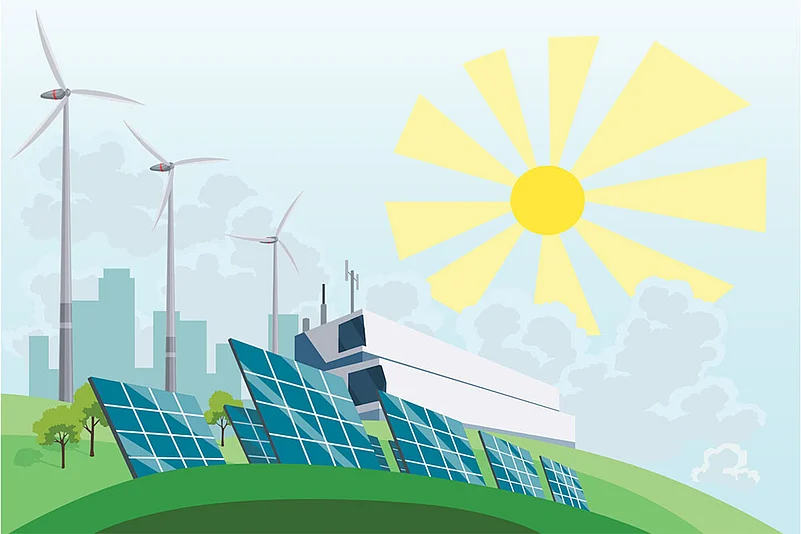The micro, small and medium enterprises (MSMEs) with three to four people per unit on average, are the pocket rockets of India’s fast-growing $3.7 trillion economy, representing 38% of its industrial output, more than 20 crore jobs and 30 per cent of its GDP. As for emissions, they account for a relatively small 12.5 per cent of all the greenhouse gases polluting the nation’s air. In stark contrast, the country’s organised manufacturing sector alone spews as much CO2 as the over six crore MSMEs, while contributing only 17% to its GDP and employing just 1.4 crore people. While these might be flattering figures, they mask an alarming reality: India’s burgeoning MSME sector lacks the resources to get any cleaner and needs much more by way of policy and budgetary support.
Acknowledging this fact, the 2024 Union Budget, promised two crucial initiatives: Investment-grade energy audits in 60 MSME clusters and financial support for clean energy transition. Those promises, however, remain largely on paper. Says Anil Bharadwaj, Secretary-General of the Federation of Indian Micro, Small, and Medium Enterprises (FISME), “no significant audits or carbon mapping has been conducted over the past year.”
So, what is the road ahead? What can the MSMEs reasonably expect from the forthcoming 2025 budget? And, what are the major stumbling blocks for these enterprises on their way to carbon neutrality?
Who Pays for the Transition
Transition is an expensive process. MSMEs in India will need to invest trillions of rupees just in green technologies to achieve carbon neutrality by 2050, which, when juxtaposed with reality, sounds like a pipe dream. While banks and financial institutions talk up the sustainability theme, few are willing to put their money where their mouth is, especially when it is about funding MSMEs. Vinod Kumar, President of the India SME Forum emphasises, "Access to affordable financing options is a major struggle as banks and financial institutions often perceive MSMEs as high-risk borrowers." Their fear is justified: As of March 2024, the NPA rate of MSMEs stood at 4.46% compared with the banking industry average of 2.74%. The question: What can the government do to de-risk loans for green investments across MSMEs?
Experts from think-tanks like the Institute for Energy Economics & Financial Analysis (IEEFA) recommend a combination of budgetary and policy interventions: They urge the government to:
1) Establish a green credit guarantee fund to absorb potential defaults and, thereby, encourage financial institutions to offer collateral-free green loans.
2) Use budgetary measures to facilitate soft loans with extended repayment terms for MSME green projects
3) Develop vehicles designed for risk-sharing between the government and financial institutions
4) Provide technical assistance and build capacity with training and support to MSMEs on green technologies and sustainable practices to hone their ability to manage such projects and reduce the risk of defaults. “Without adequate training and awareness, transition to eco-friendly processes will remain a distant goal,” Kumar of India SME Forum points out. "MSMEs lack the expertise to identify areas for emission reductions and implement necessary changes."
These are among the steps that need to be rolled out across the entire MSME space with a special focus on the five sectors responsible for 50% of all the emissions, namely Textiles (20%), Steel Re-rolling (10%), Paper: (8%), Foundry (8%) and Food Processing (5%).
Budget 2025: The MSME Wishlist
In the run up to the Budget, MSMEs are hopeful for substantial fiscal and policy action to accelerate transition across the more than six crore units that make up India’s MSME universe. To this end the India SME Forum has sounded a slew of suggestions in its pre-budget consultations with the government. These include:
1) Promote green technology adoption by revitalising the Green MSME Initiative, which offers institutional finance at concessional rates to minimise the cost of solar and wind energy technologies. The Green MSE portal needs to be made more accessible and aggressively promoted to boost traffic.
2) Facilitate subsidised loans, grants, and preferential funding for investment in sustainable solutions like solar energy, waste recycling technologies and energy-efficient equipment.
3) Provide easy access to training, workshops, and consultancy services to build the technical capability of key people in the MSME space about sustainable practices and energy-efficient processes.
4) Pilot projects to demonstrate recycling, reusing, and repurposing waste materials within production processes to drive sustainability. Kumar notes, "Without government incentives, India’s circular economy projects, from collecting waste to promoting recycled products, will remain in the doldrums."
5) Incentivise the use of recycled materials and obtaining sustainability certifications that result in tangible benefits to MSMEs.
The Cost of Inaction
With global markets increasingly courting companies wedded to sustainable practices, failure to support MSMEs in their green transition could significantly erode their competitiveness. The environmental impact of continued emissions is bound to exacerbate climate change, which would inevitably lead to more stringent regulations in the future. More significantly, India cannot achieve its sustainability ambitions without the active participation of a sector that represents one-third of its economy.
While the carbon footprint of MSMEs is relatively modest compared to that of the power, steel, cement, fertilizer and chemical behemoths, their journey toward net-zero emissions remains fraught with challenges. Targeted government support, financial incentives, and capacity-building initiatives are imperative to empower this sector to contribute meaningfully to India's sustainability goals.




























